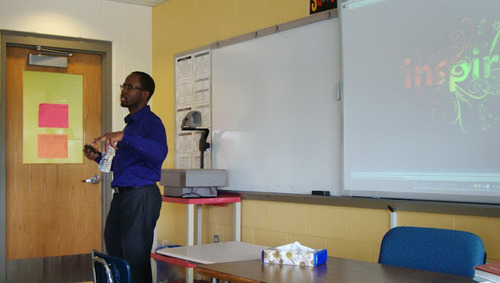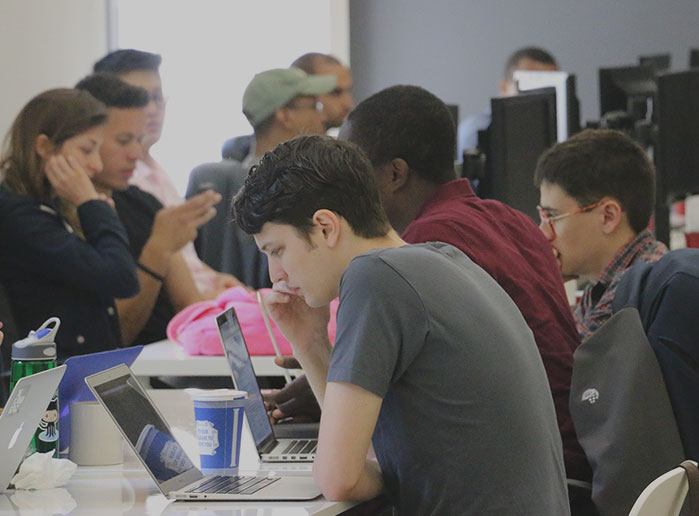Keith Williams grew up with limited expectations of success. Although he didn’t have a computer at home, he did have a lot of people around who supported him through school and guided him into a career in tech. Now a graduate of the NYC Web Development Fellowship and Web Engineer at Markerbot, Keith chatted with us about mentorship and his decision to start programming.

Can you share a little bit more about your background? What were you doing before you came to Flatiron School?
I went to NYU Poly, and got a degree in electrical engineering from NYU. After college, I worked as an engineer for five years, and left to become a tech consultant at Accenture. I always wanted to be in computer science but I never really had the opportunity. I went from electrical engineering to tech consulting in the hopes of getting more involved with software—but it didn’t end up happening. By the time I left Accenture, I was ready to just go for it and learn on my own.
What made you decide to leave tech consulting and start learning how to program?
I didn’t really have one moment when I knew I wanted to learn how to program. I’ve always loved technology. It was more about figuring out that it was something I could do and that it was an option for me. Growing up in a poor neighborhood in Philadelphia, my expectations of success were limited. I don’t think I really knew what to do with my life because I didn’t really see an endpoint that far from where I started.
There were plenty of opportunities for bad influence, but my parents were really invested in helping me succeed. They knew that if I had an education, I could probably do something good. I focused on learning, but other than that, I knew I loved computers. I didn’t have a computer at home so in high school I convinced the janitors to let me in the computer lab before school started. One of the computer science teachers found me in the lab and gave me a few books. She ended up being a kind of mentor, and guided me into pursuing a career in tech.
That was how it started. Then, while I was working at Accenture, I had basically become a project manager—assigning work and acting as a pipeline between people who needed things done and the people who actually did them. It was fine, but I wanted to be the one actually doing the creating and building. I wanted to feel like I was actually making something that affected people in a positive way. I wasn’t really sure what I wanted to make, yet. I just knew that I wanted to be a programmer and make something positive.
It seems like mentorship and good influences—your teachers and parents—made a big impact. How did they affect your career choice?
Yeah, they definitely did. Having excellent mentors has been a running theme throughout my life. I’ve had these people who were always very supportive of me and guided me. I was lucky enough to have found positive influences in my parents, teachers, and mentors in high school and to have followed their advice.
The same thing happened with Flatiron School. When I figured out I wanted to switch careers, I found a Meetup geared toward diversity in tech called Black Techies. It was through that group that I met Blake, one of the Fellowship Instructors. Blake was someone like me who wanted to get into technology and made a leap to do it. He told me about the NYC Web Development Fellowship. I applied and thought, “We’ll see.” I’m happy it has worked out—and that other people were a really big part of getting me here.
My classmates and instructors during the Fellowship—we were all from different backgrounds. We grew up differently, in different places with different interests. Whenever I or anyone else needed help, inevitably one of my them would use an analogy to explain the material that made me feel like, “Oh, I never thought about it like that.” Having all of these points of view made a huge difference. I’m just thankful to have even met these people.
“I’m just thankful to have even met these people.”
That’s great! So have you gotten a chance to do something good?
Yeah, absolutely. Learning to program opened up a lot of opportunities for me to do good, from teaching to actually building things. At Flatiron School, a classmate and I started working on an app to help connect restaurants that were throwing out food with homeless shelters. We started building it and everything was going well, but ultimately we weren’t in the restaurant industry and we didn’t know anything about delivering food to homeless people. We were just going from instinct.
It turned out that another classmate knew someone running a non-profit that did exactly what we wanted to do—help take food from restaurants and give it to homeless shelters. We were able to meet with them a few times and help them build up to and better understand what a system like this might look like. That made us feel really good—we were actually affecting change in real life.
I can say the same thing of my current job. I’m a developer at MakerBot—a company that’s leading a revolution in 3D printing and in DIY. They are bringing the power of manufacturing down to the consumer level so that anyone can make anything. I feel like I’m learning every minute of the day and I get to be a part of this bigger movement in tech.
Do you have any advice for people who have a background like yours and want to learn more about technology?
Just starting to learn how to program is really overwhelming. This feeling is compounded when you’re a part of a visible minority group. When I first started, I thought that to be a true computer scientist I had to go to school, get a Masters or a PhD, understand ins and outs of algorithms, and be able to write my own libraries. I think a lot of people have this misunderstanding.
People buy into the stereotypes of that it means to be successful as a developer—like they have to be exceptional at math and start writing code as five-year-olds. I never had a computer growing up, so I feel like web development is available to anyone who is excited about technology and willing to put in the effort. It is all a matter of knowing this is an option. A lot of times, it just comes down to someone else encouraging you and giving the confidence to do it.
“Web development is available to anyone who is excited about technology and willing to put in the effort.”
I really want to help people reach this point. I’m happy to help them start learning how to code—I’ll give an introductory course to anyone who asks. I also volunteer as much as I can and go back to my high school in Philadelphia once in awhile. I want to help people get excited about technology or even about the fact that their background doesn’t have to define their futures.
Ultimately, I’d like to be an inspiration for people to follow their passions and pursue their dreams regardless of where they came from. I want them to know that they can choose their direction in life. It feels like there’s a ceiling and maybe that ceiling is their financial situation or it’s their own self-confidence—but this doesn’t have to keep them down. They can do it. They can do anything.
Keep in touch with Keith on Twitter or read more Alumni Stories.
hbspt.cta.load(69751, ‘d4985497-5ea1-4511-a5e2-73d3cc2aa9b6’);
Written byFLATIRON SCHOOL
Make yourself useful.

